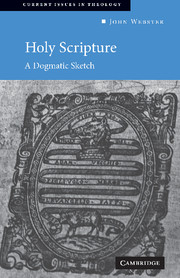Introduction
Published online by Cambridge University Press: 05 June 2012
Summary
What follows is a dogmatic sketch of a topic much neglected in contemporary theology, namely, the nature of Holy Scripture. It is only a sketch, not a treatise, and many issues which ought properly to be considered in a full account – the relation of Scripture and tradition, or of Scripture and preaching, for example – do not receive treatment. I am also conscious that I have little to say about topics which are very fully discussed in modern theology and hermeneutics. I offer no theory of ‘textuality’, and say almost nothing about such matters as the impact of deconstruction or of speech-act theory on thinking about the nature of Scripture, or the workings of interpretative communities. Whether these omissions are deficiencies I leave to the reader's judgement. The subjects to which I have addressed myself are chosen because they appear to me to constitute the essential articles of an orderly dogmatic account of what Holy Scripture is.
But is there such a thing as Holy Scripture? Theorists in cultural and religious studies, and more than a handful of modern theologians, seek to persuade us that there is not: that the term ‘Holy Scripture’ is an extension of the term ‘scripture’, and refers not to properties which the biblical canon has by virtue of its relation to God's communicative activity, but to the activities of human agents in constituting a cultural and religious world.
- Type
- Chapter
- Information
- Holy ScriptureA Dogmatic Sketch, pp. 1 - 4Publisher: Cambridge University PressPrint publication year: 2003



